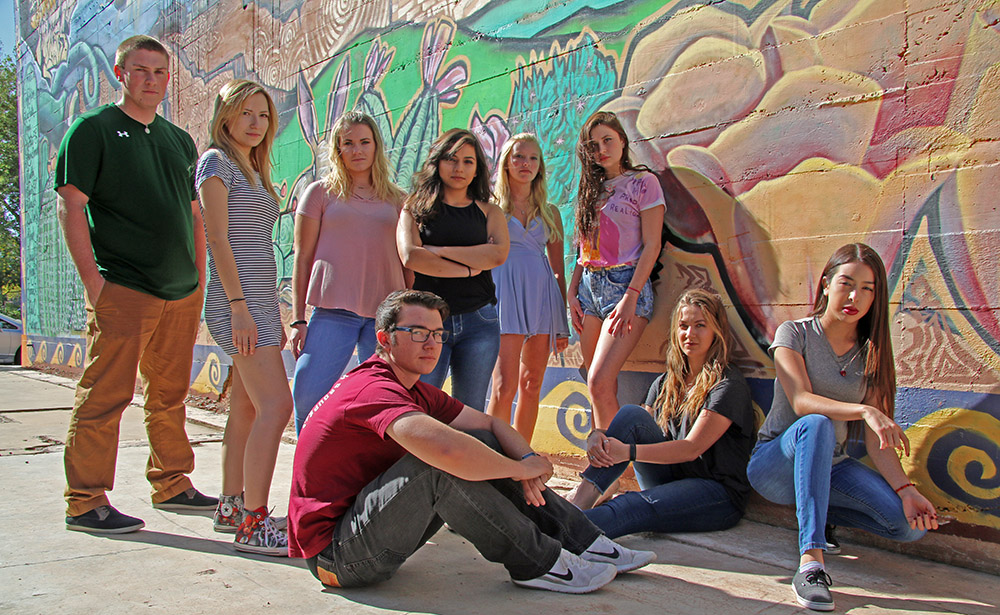
Criminology freshmen showcase inmate art at First Friday exhibit
Emma Richburg never thought she’d be putting on an art show as a freshman criminology and criminal justice major. But she is helping put up drawings, paintings and other items for display at Unexpected Art Studio, a former warehouse on Polk Street located between Grand Ave and 7th Avenue. The works of art will be sold at the May 5 First Friday -- the hip art, entertainment and food event that draws thousands of people to Roosevelt Row and Grand Ave in downtown Phoenix each month.
But this art show will be different from the dozens of other exhibits First Friday patrons will encounter. This art was done by inmates serving time in the Arizona State Prison Complex in Florence. The exhibit is called (Ink)arcerated: Creativity within Confinement.
“We're going to try our best to display it in a very respectful and hopefully creative way where people will see it in a different manner and change their current mindset,” said Richburg.
The mindset that Richburg is referring to is one in which people are locked up and forgotten.
“People think that once someone's put away the problem is stopped, that the issue is done,” she said. “People don't understand that the same person you're putting into a very hard system is going to come out into your community.
And that's what we're trying to change. We want to better them so when they come out and they have been rehabilitated and they will actually better the community that you, your family and everyone else living there.”
Richburg and her classmates are learning about incarceration as part of a new type of ASU course called Promod, which stands for “project-based modular learning.” There is no textbook, no mid-terms. Instead, freshmen learn about a particular community problem by becoming immersed in the topic and work as a team on a solution. In this case, an art exhibit.
Kevin Wright, an associate professor in the School of Criminology and Criminal Justice, teaches ASU 140 “Prisons: Getting Out and Staying Out.” He took the nine students in the class on a tour of a state prison in Florence where they learned about what programs are offered to inmates.
“We talked to the warden and we got to actually walk into a classroom of prisoners who were learning about drawing from a teacher,” said Richburg. “And there are other programs that allow prisoners to express their feelings in ways other than violence.”
“I knew when I was signing up for this class that we would have a field trip to the prison but I had no idea what that all entailed and that was kind of a reason we chose to do this,” said Madysen Genzmer. “But once I actually experienced this class I realized that it's literally a once in a lifetime opportunity.”
Genzmer has since learned about the prison crisis in America. There are 1.5 million men and women in prison and 95% of them will be released. Yet, most go on to commit new crimes. A national study of 400,000 inmates released from prison found that within a three-year period two-thirds of them had been rearrested.
“A person only gets punished for so long and then they return to our communities,” Genzmer said. “And if they're not rehabilitated they're going to go right back into the same cycle and they're going to commit the crime again. So we need to rehabilitate and not just lock up and forget about them.”
Students created teams to work on various aspects of the show, including fundraising to pay for it. A crowdsource funding campaign raised more than $3,100 to to rent the exhibit space and buy food for guests.
Genzmer says the art exhibit will allow students the opportunity to talk about the importance of programs that will help inmates once they’re released. But the show will do more than that. Students are selling the artwork. A small portion will pay for the supplies used to make the art, but all other proceeds will benefit the Pinal County Family Advocacy Center and Children First Leadership Academy.
“All the money that we're raising at the art show is going to two organizations, one for abused mothers and children and another for impoverished and homeless kids,” said Genzmer.
[[{"attributes":{},"fields":{}}]]